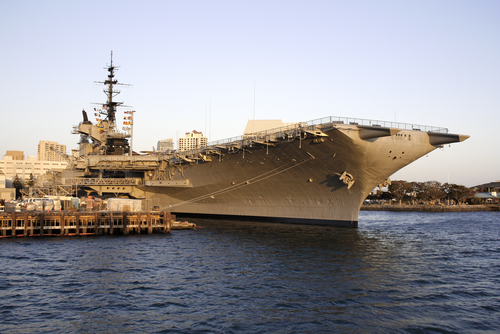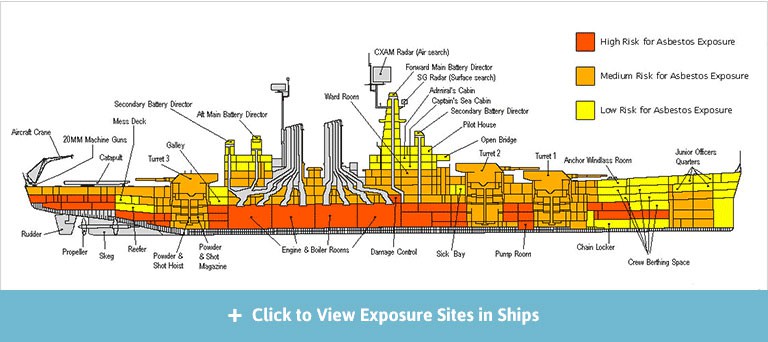Navy veteran Bob Niemiec entered the Navy in 1965 at the age of 20. His first assignment out of boot camp was to scrape paint off of the landing ship U.S.S. Hermitage. It turns out the paint he was scraping contained asbestos. Niemiec said he didn’t feel the effects of the asbestos exposure until many years later, about 30 years after his stint in the Navy.
Asbestos Exposure on Navy Ships
Before the dangers of asbestos were widely known, more than 300 asbestos products were in use on U.S. Navy ships from the 1930s to the early 1980s. This decision to heavily use asbestos placed Navy veterans at risk for mesothelioma and other serious respiratory illnesses.

Asbestos on Navy Ships
U.S. Navy vessels built prior to 1980 were laden with asbestos products. Exposure to asbestos aboard naval vessels caused many veterans to later develop mesothelioma and other serious asbestos-related conditions.
More than 300 asbestos-containing materials were used in naval ships until the mid-1970s, when the public became more widely aware of the health risks associated with asbestos. Engine and boiler rooms, mess halls, navigation rooms, sleeping quarters and other common areas on Navy ships contained asbestos.
Navy veterans are at a high risk of developing mesothelioma because of the amount of asbestos the United States military used. Veterans were exposed to asbestos during the course of doing their jobs aboard ship in the Navy or Coast Guard.
Veterans diagnosed with illnesses that are a result of military asbestos exposure are entitled to disability compensation. There are also survivor benefits for spouses of veterans who died of service-related cancer.
To file a successful VA claim for these benefits, the claimant must specify where, when and how the military asbestos exposure occurred. The Department of Veterans Affairs must know what asbestos materials caused the exposure during the veteran’s service.
Navy Occupations With High Asbestos Exposure
Naval records from ship databases, letters, memos, repair logs, war diaries and historical documents confirm many Navy occupations posed a risk of high asbestos exposure as vessels used asbestos in many types of equipment.
Certain naval jobs had a higher risk of exposure because they required personnel to maintain or repair asbestos-containing materials. This work created asbestos dust that personnel could easily inhale.
High Asbestos Risk Navy Jobs
- Boatswain’s mate
- Damage controlman
- Electrician’s mate
- Fire control technician
- Gunner’s mate
- Hull maintenance technician
- Machinery repairman
- Machinist’s mate
- Metalsmith
- Pipefitter
- Water tender
- Welder
A recent quantitative assessment published in the International Journal of Radiation Biology studied 114,000 Navy veterans. The research showed Navy personnel who worked as machinist’s mates, boiler technicians, pipe fitters, fire control technicians and water tenders had the highest mesothelioma mortality rates of those in the study.
Where was asbestos in your Navy ship?
- Years Active:
- Hull Number:
- Ship Type:
- Ship Builder:
Items on Navy Ships Containing Asbestos
Equipment above and below deck had asbestos packed inside, sprayed on or embedded in the material. Major sources of exposure included boilers, pipes, pumps and valves.
Boilers were coated with external insulation containing about 15% asbestos, contained loose asbestos packing and had asbestos gaskets. Insulation coated a sprawling network of pipes with a felt layer that contained 5% to 50% asbestos. Damaged coating required service members to mix dry asbestos with water to make new insulation coating.
Navy Equipment With Asbestos
- Adhesives
- Aggregate mixtures
- Bedding compounds
- Block insulation
- Boilers
- Cables
- Capacitors
- Deck-covering materials
- Gaskets
- Grinders
- Hydraulic assemblies
- Insulating materials
- Paneling
- Pipe insulation
- Pumps
- Packing materials
- Thermal materials
- Tubes
- Valves
Machinist’s mates risked asbestos exposure when replacing worn asbestos gaskets inside mechanical pumps that powered heating, cooling and bilge systems. To remove stubborn gaskets, they used scrapers and wire brushes, releasing toxic asbestos fibers. Pipefitters, boiler operators and other Navy crew members were also exposed when working with valves on ships that contained asbestos gaskets, had asbestos insulation coatings and were filled with asbestos packing.
There were no requirements for most naval personnel to wear protective air masks or wet down asbestos-containing materials before removal to help prevent fibers from going airborne. A lack of enforcement of safety measures contributed greatly to the risk of asbestos exposure on board.
Asbestos on Navy Ships Today
There are fewer products containing asbestos onboard Navy ships and in shipyards today. However, asbestos is still permitted if another alternative isn’t available. The Navy doesn’t make it public when it approves the use of asbestos on ships today. This makes it difficult to assess how often it happens.
The Navy has taken action to remove existing asbestos from its ships. But as the material becomes more brittle with age, removal becomes more difficult. It can be more hazardous to worker health if proper safety guidelines aren’t followed.
Despite the Navy’s removal of many asbestos products, the toxic mineral remains on many ships today. As of January 2024, the Navy has approximately 530 ships both in active service and the reserve fleet. Approximately 85 more vessels are in the planning or construction phases.
Navy Veterans and Mesothelioma
Asbestos exposure has harmed many veterans’ health. The U.S. Department of Health and Human Services, the U.S. Environmental Protection Agency and the International Agency for Research on Cancer classify it as carcinogenic. The IARC says there is enough evidence linking asbestos to mesothelioma.
When unprotected workers inhale asbestos fibers, the fibers can become embedded in the layer of tissue surrounding the lungs. These embedded fibers can cause irritation and scarring.
Over the course of several decades, asbestos causes cellular and genetic damage that can result in tumor growth and the development of malignant mesothelioma cancer. The prognosis for patients diagnosed with pleural mesothelioma, the most common type of this cancer, is typically poor.
Can I Sue the Navy to Seek Compensation for Mesothelioma?
Veterans seeking mesothelioma compensation don’t sue the Navy. They file lawsuits against the companies that made asbestos products used on Navy ships. Many of these lawsuits have been successful, resulting in settlements and verdicts that have covered medical expenses, travel costs and lost wages.
Mesothelioma Compensation for Veterans
- Asbestos Trust Funds: If someone develops mesothelioma from exposure to asbestos from a bankrupt company’s product, their legal claim may be processed through the company’s trust fund rather than the traditional court system.
- Personal Injury Claims: Individuals diagnosed with mesothelioma pursue these lawsuits to seek compensation for expenses such as medical bills, lost wages and other related costs.
- VA Claims: Veterans diagnosed with mesothelioma or other asbestos-related diseases may qualify for disability compensation or benefits through the Department of Veterans Affairs.
- Wrongful Death Claims: The estate of a deceased family member can initiate this type of lawsuit to seek compensation.
Many of the sailors, officers and shipyard workers who developed asbestos-related diseases are also eligible for VA benefits. They may also be able to file claims with asbestos trust funds. These funds were created when asbestos companies declared bankruptcy to ensure future claimants could access this resource for compensation.
Access Free VA Claims Assistance

Free Cancer Guide for Veterans

Find a Top Mesothelioma Doctor

Types of Navy Ships With Asbestos
Asbestos contamination wasn’t limited to one specific class of vessel. Asbestos was used in everything from destroyers to aircraft carriers.

The most concentrated exposure happened below deck in places like engine and boiler rooms because of the lack of ventilation. However, exposure still occurred on deck when service members maintained or repaired asbestos-containing products such as deck matting and tiles.
Navy Equipment With Asbestos
- Adhesives
- Aggregate mixtures
- Bedding compounds
- Block insulation
- Boilers
- Cables
- Capacitors
- Deck-covering materials
- Gaskets
- Grinders
- Hydraulic assemblies
- Insulating materials
- Paneling
- Pipe insulation
- Pumps
- Packing materials
- Thermal materials
- Tubes
- Valves
Machinist’s mates risked asbestos exposure when replacing worn asbestos gaskets in pumps. These pumps powered the heating, cooling and bilge systems. Navy crew members, including pipefitters and boiler operators, were also exposed. They worked with valves on ships with asbestos gaskets, insulation and packing.
Most naval personnel were not required to wear air masks or wet down asbestos before removal. These methods helped limit asbestos fibers from becoming airborne. A lack of enforcement of safety measures increased the risk of asbestos exposure on board.
Asbestos causes cellular and genetic damage over decades. It can lead to tumors and malignant mesothelioma. The outlook for patients with pleural mesothelioma, the most common cancer, is often poor.
Legal Options for Navy Veterans Exposed to Asbestos
Navy veterans can seek compensation for illnesses linked to asbestos. They have several ways to do so. Veterans seeking mesothelioma compensation don’t sue the Navy. They sue the companies that made asbestos products used on Navy ships. Many of these lawsuits have been successful. They resulted in settlements and verdicts that covered medical expenses, travel costs and lost wages.
Mesothelioma Compensation for Navy Veterans
- Asbestos Trust Funds: If someone develops mesothelioma from exposure to asbestos from a bankrupt company’s product, their legal claim may be processed through the company’s trust fund rather than the traditional court system.
- Personal Injury Claims: Individuals diagnosed with mesothelioma pursue these lawsuits to seek compensation for expenses such as medical bills, lost wages and other related costs.
- VA Claims: Veterans diagnosed with mesothelioma or other asbestos-related diseases may qualify for disability compensation or benefits through the Department of Veterans Affairs.
- Wrongful Death Claims: The estate of a deceased family member can initiate this type of lawsuit to seek compensation.
Many of the sailors, officers and shipyard workers with asbestos diseases are also eligible for VA benefits. They may be able to file claims with asbestos trust funds. Asbestos companies set up these funds when they went bankrupt. This lets future claimants use them for compensation.
“The professionalism and expert advice The Mesothelioma Center at Asbestos.com extended to us was truly a blessing as we dealt with my father’s mesothelioma.”, Steve Reeck, son of a mesothelioma patient says. “The advocacy group’s expert guidance and advice dealing with the Veterans Administration was a miracle for my family. Thank you for everything.”

Learn how to access benefits available to veterans affected by an asbestos-related illness.
Get Help NowAsbestos on Navy Ships Today
Asbestos-containing ships are still in service. But there are fewer products containing asbestos onboard Navy ships and in shipyards today. Asbestos is still permitted if another alternative isn’t available. The Navy doesn’t make it public when it approves the use of asbestos on ships today. This makes it difficult to assess how often it happens.
The Navy has taken action to remove existing asbestos from its ships. But as the material becomes more brittle with age, removal becomes more difficult. It can be more hazardous to worker health if proper safety guidelines aren’t followed.
As of October 2024, the Navy has approximately 530 ships both in active service and the reserve fleet. Approximately 85 more vessels are in the planning or construction phases.
Navy veteran Bob Niemiec entered the Navy in 1965 at the age of 20. His first assignment out of boot camp was to scrape paint off of the landing ship U.S.S. Hermitage. It turns out the paint he was scraping contained asbestos. Niemiec said he didn’t feel the effects of the asbestos exposure until many years later, about 30 years after his stint in the Navy.
Common Questions About Asbestos on Navy Ships
- What are the health risks associated with asbestos exposure on navy ships?
-
Asbestos exposure can cause restrictive and interstitial lung diseases, asbestosis, pleural plaques and mesothelioma cancer of the pleura and peritoneum. It can also cause cancers of the lung, bronchus, gastrointestinal tract, larynx, pharynx and urogenital system (except the prostate).
Answered By: Aaron Munz, Director of Veterans Department & Former U.S. Army Captain
- Are navy ship workers still at risk of asbestos exposure today?
-
Some older ships with keels laid before 1983 may still have some asbestos materials and equipment. Current regulations are stricter about its use and presence today. Asbestos must be clearly labeled now. Personnel who are required to work with asbestos equipment should receive training and personal protective equipment.
Answered By: Aaron Munz, Director of Veterans Department & Former U.S. Army Captain
- Did the Navy take any precautions to protect sailors from asbestos exposure?
-
Beginning in the late 1970s the Navy began replacing asbestos materials on ships where a suitable alternative existed. In the 1980s ships went through yard periods to remove and replace asbestos. Today, regulations require labeling and safe handling for any remaining asbestos in use.
Answered By: Aaron Munz, Director of Veterans Department & Former U.S. Army Captain?




